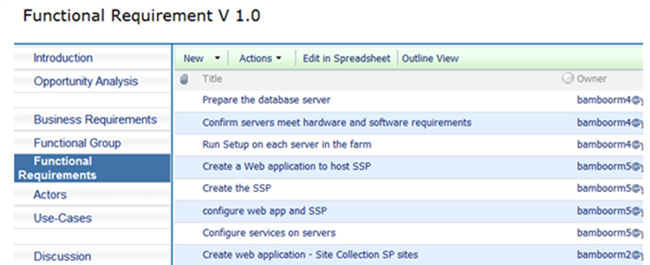Bamboo Solutions is heading up the food chain, building off its position in SharePoint Web Parts to deliver a hosted requirements management solution as the first of several SharePoint-based hosted applications the company plans to roll out this year.
Bamboo took the SharePoint presentation layer and leveraged Web Parts for team e-mails, custom navigation, reporting, and more to create Bamboo RM, which is available now on a free trial basis provisioned for up to 10 users.
“The collaborative capabilities inherent in SharePoint are wonderful,” said Marc O’Brien, general manager of the new Bamboo Online Applications division working on the new targeted applications. O’Brien also said SharePoint enables workflows, such as approval processes, to be easily inserted into requirements. Wikis, discussion forums, and alerts enable discussion and action on business and functional requirements, he added.
Bamboo RM, which sells for US$29.95 per user per month and launched on Jan. 28, is hosted on Windows SharePoint Services 3.0. “It’s not restricted to [Microsoft Office SharePoint Server], which can be costly and burdensome,” O’Brien said.
O’Brien had been the founder and CEO at Projity, which created a software-as-a-service project management solution, before it was acquired by Serena Software in September 2008. He left the organization to launch a hosted requirements management venture and found that Bamboo had had the same idea, so he got on board with Bamboo, where SharePoint became an integral part of the hosted solution.
People who don’t normally use Microsoft’s collaboration and document management platform were “astounded at how easy” SharePoint made working with remote parts of the organization. “Geographically dispersed teams are the nature of the game now,” O’Brien said. “Being able to get a team up to speed in [a short amount of time] is a huge value proposition.”
O’Brien said Bamboo’s opportunity in the traditional ALM market will be strong, but he said the company would “ultimately like to see [Bamboo RM] push requirements management past that segment into other areas. Most projects that fail don’t fulfill the requirements of the sponsor. This is true not just in development, but in consumer product packaging, for example.”
As for use in organizations using lean business practice or agile development practices, O’Brien said the iterative nature of those practices puts even more of a focus on understanding what a project’s requirements are because they’re changing.
O’Brien added that the company has plans to move its Project Management Central solution onto a hosted platform, but he could not yet provide details.
O’Brien said the company might also look at on-premises versions of the applications it’s building out, but he emphasized, “We’re a SaaS group, and I’m a SaaS guy.”
SOURCE: SD Times Magazine

